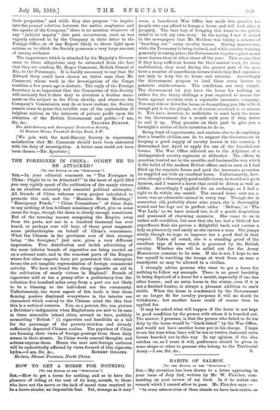HOW TO GET A HORSE FOR NOTHING.
ITO THE EDITOR OF THE "SPECTATOR."]
Sin,—How to get a horse for nothing, and so to have the pleasure of riding at the cost of its keep, sounds, to those who have not the nerve or the lack of moral tone required to be a horse-stealer, an impossible feat. Yet, strange as it may seem, a beneficent War Office has made this possible for people who can afford to forage a horse and will look after it- properly. The best way of bringing this home to the public mind is to tell my own story. In the spring I saw it stated in the newspapers that Mr. Haldane was trying a scheme of "boarding out" extra cavalry horses. During manoeuvres, while the Yeomanry is being trained, and while cavalry training generally is taking place, the Government require a great many more horses than at other times of the year. This means that if they keep sufficient horses for their annual work, let alone mobilisation, they must during the greater part of the year have a number of superfluous horses which they find expensive not only to keep but to house and exercise. Accordingly the Government propose to lend these extra horses to patriotic stable-owners. The conditions are very simple. The Government let you have the horse for nothing, or rather for the thirty shillings a year required to insure the horse against accident with a reputable insurance company. You may ride or drive the horse, or do anything you like with it except put it to the plough, or of course overwork it or misuse it. You have, however, to undertake to send back the horse to the Government for a month each year if they desire to call it up. They promise on their part to give you a. fortnight's notice of their intention to do so.
Being fond of experiments, and anxious also to do anything that a humble civilian can do to support the Government in keeping a good supply of cavalry horses in the country, I determined last April to apply for one of the boarded-out horses. The War Office referred me to the Adjutant of a distinguished cavalry regiment at Aldershot. The officer in question treated me in the sensible and businesslike way which is the habit of the modern British officer, and as soon as I had filled up the requisite forms and paid the insurance premium he supplied me with an excellent horse. Unfortunately, how- ever, though a thoroughly good saddle-horse, he would not go in harness, and I wanted a horse that could be driven as well as ridden. Accordingly I applied for an exchange, as I had a right to do within one month. The second horse sent me, a mare, was an admirable animal in every way. Though she is somewhat old, probably about nine years, she is thoroughly sound and her legs are in perfect order. Bellona,' or The War Lady,' as we have named her, is of a gentle disposition and possessed of charming manners. She came to us in rather soft condition, but now that she has lost a little of her superfluous flesh she proves a delightful hack, and carries a lady as pleasantly and easily as she carries a man. She jumps nicely, though we hope to improve her a good deal in that
respect. Taken all round, she is a standing proof of the excellent type of horse which is procured by the British cavalry. Whether she will be called out for the Army
Manoeuvres remains to be seen. If she is not, I hope to use her myself in watching the troops at work from as near a standpoint as may be allowed to a civilian.
I strongly advise persons who want to get a horse for nothing to follow my example. There is no great hardship in being deprived of a horse for a month, especially if one has other horses ; and an extra horse in the winter, even if it is not a finished hunter, is always a pleasant addition to one's
stable. When the horse is condemned by the Government as no longer fit for cavalry purposes it will no doubt be withdrawn ; but another horse could of course then be applied for.
It may be asked what will happen if the horse is not kept in good condition by the person with whom it is boarded out.
The answer, I presume, is that the person who failed to do his duty by the horse would be "black-listed" by the War Office, and would not have another horse put in his charge. I hope to see the time when there will be ten or twelve thousand extra horses boarded out in this way. In my opinion, if the idea catches on, as I trust it will, preference should be given in some shape or other to persons who belong to the Territorial






































 Previous page
Previous page